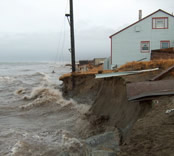
A fall storm erodes Shishmaref
Shishmaref Relocation Coalition
Climate change has already begun to trigger big differences in Alaska and the Arctic: new coastal erosion and flooding, retreating glaciers, greening tundra, ailing forests, insect outbreaks, shifts in fish and wildlife, and warming permafrost.
Last week, as the Earth exited the warmest winter on record, climate scientists at the National Ice and Snow Data Center published a study saying summer sea ice will almost certainly disappear within a generation.
“The take home message from my perspective is that a human influence on the Arctic’s shrinking sea ice cover is a lock, and that as we continue to lose ice, we will start to see effects extending beyond the Arctic,” NSIDC climate scientist Mark Serreze told Far North Science.
Add it all up, and the threat of global warming constitutes a “true planetary emergency,” former Vice President Al Gore told several Congressional panels on March 21 in Washington, D.C. But it’s not too late for Congress to act.
Gore urged lawmakers to heed the growing bounty of hard evidence that climate change may be speeding up due to greenhouse gases. The United States must act as a leader in cutting emissions, even though other countries like China must also participate to derail the trend toward catastrophic warming. In working out the best response, people must discard the nonsense and listen to peer-reviewed science.
In an obvious reference to celebrity writer Michael Crichton’s State of Fear, a fantasy thriller that portrays global warming as a sinister plot foisted on the American people, Gore continued.
"The planet has a fever. If your baby has a fever, you go to the doctor,” he was quoted in a New York Times story. “If the doctor says you need to intervene here, you don't say 'I read a science fiction novel that says it's not a problem.' You take action."
Gore was also scheduled to appear before the Senate Committee on Environment and Public Works later in the day.
Media Watch: A quotefest commeth
It should be an interesting visit. A March 20 column by ranking minority member Sen. Jim Inhofe (R-Okla.) proves once more that, unlike certain other malodorous substances, disinformation can flow uphill. To Capitol Hill, that is.
One day before almost-president-turned-climate-activist was to appear, Inhofe threw down the gauntlet (perhaps a mitten, in honor of global cooling?) when he trotted out a discredited New York Times story that claimed existence of a widespread backlash against Gore’s documentary An Inconvenient Truth
The Times story, published March 13 by writer William Broad, showed that “we’re all skeptics now,” wrote Inhofe, in a commentary published by The Politico.
When the old gray lady says it’s over, it’s over.
The New York Times — nearly a year late — is finally recognizing the scientific reality regarding fears of a man-made climate catastrophe. On March 13, a landmark article stated “scientists argue that some of (former Vice President Al) Gore’s central points are exaggerated and erroneous.”
Inhofe concludes:
The real inconvenient truth is that global warming fearmongers have overplayed their hand and are now suffering a massive scientific and media backlash. America needs a rational science debate about climate variability. Achieving that goal now appears closer to reality.
But Inhofe’s discussion — like Broad’s story before it — built its case on a foundation of bad science, discredited theories, fringe thinking and distorted data. It’s not unlike denying the principle of biological evolution by citing “studies” of creation science published by pastors on fundamentalist websites. (For an earlier perspective, see Realclimate.org’s take on Inhofe’s Senate work on climate.)
However understanding of climate change plays out among scientists, it’s critical that people keep a grip on what’s known and not let the topic get hijacked by those with an agenda to protect the status quo. We posted links exploring the original disinformation last week in That Inconvenient Gore.
Where should regular people go for an independent look? Start with the Intergovernmental Panel on Climate Change, a United Nations group that called evidence of climate warming “unequivocal” and proclaimed that human-generated greenhouse gas emissions are “very likely” the single biggest cause in its summary for policy makers released in February.

